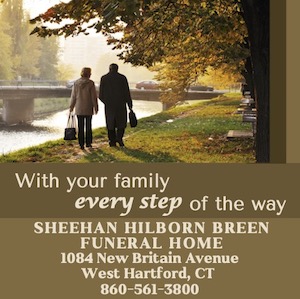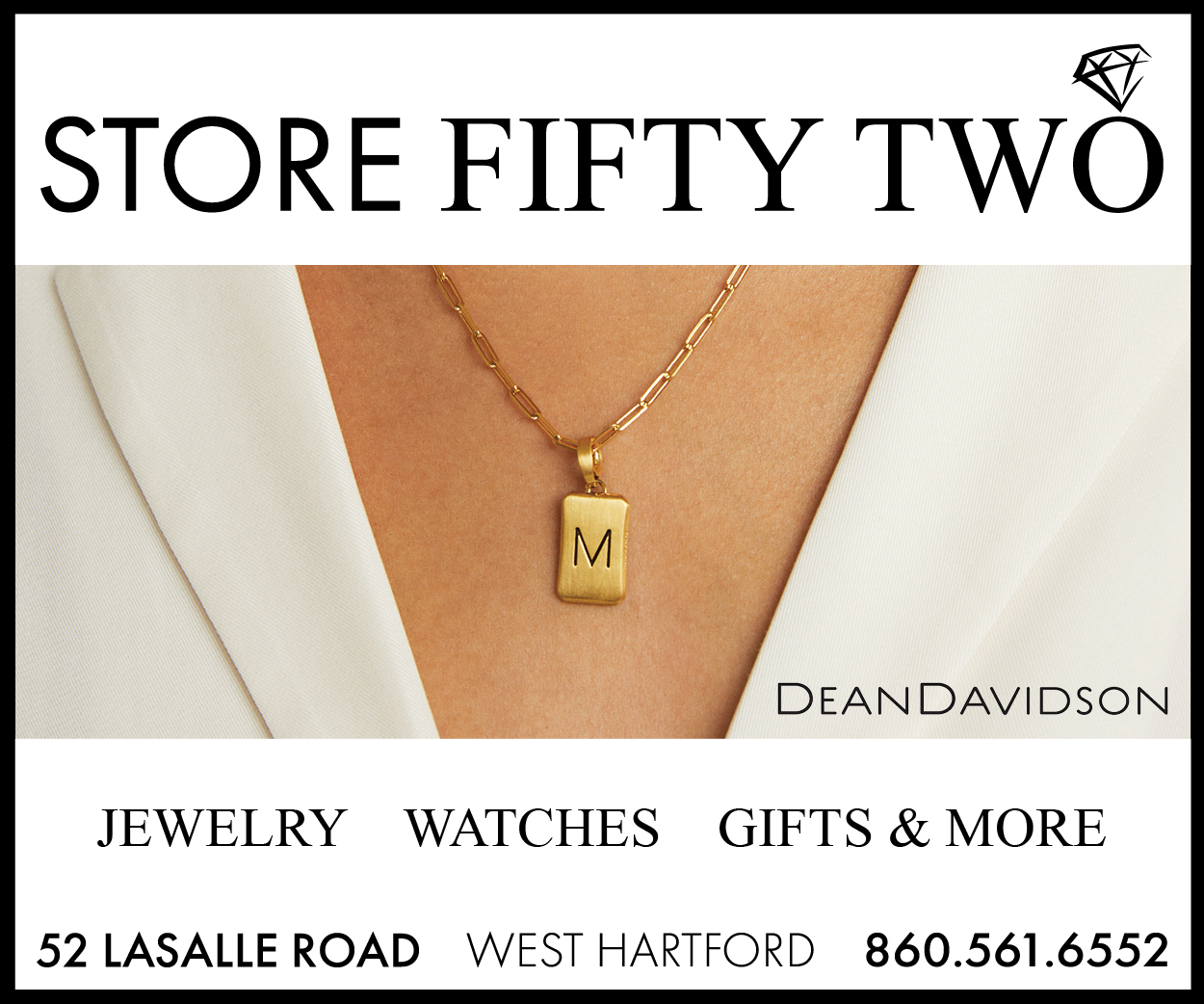
“It was time to return to the energy of a short-term, event-filled book festival,” says Jill Ziplow, director of the 25th Annual Mandell JCC Jewish Book Festival, which opens Sunday afternoon, Oct. 8 with a talk by kosher culinary guru Joan Nathan, and closes Saturday evening, Nov. 18, with the sharp and inciteful wit of actor-cum-author Stephen Tobolowsky.
The popular festival, which had switched several years ago from its fall-only event format to a year-long series, is returning to its roots by featuring eight authors.
“This year, we’re doing it all in the fall with more authors, more topics and more venues,” say festival co-chairs Laurie Goldsmith and Beth Papermaster. “Our committee has worked hard to bring you programs to get you cooking, laughing, thinking and, as always, reading!”
Here’s a brief look at just a few of the festival highlights.
For more information and/or to download a festival brochure visit mandelljcc.org. For tickets call (860) 231-6316 or email tickets@mandelljcc.org.
 SUNDAY, OCTOBER 8, 2 p.m. — Popular cookbook author Joan Nathan, winner of the James Beard Award, talks about her new book King Solomon’s Table: A Culinary Exploration of Jewish Cooking from Around the World. The author of 11 books — including Jewish Cooking in America and The New American Cooking, both of which won the James Beard and IACP Awards — takes us on her culinary travels from India to France, Italy to Mexico, El Salvador to Israel and, of course, all across North America. Held at the Mandell JCC. Tickets: $40 (includes a copy of King Solomon’s Table.) A pre-event lunch with Joan, featuring her recipes, a signed copy of her book and reserved event seating, is also on the table for $100.
SUNDAY, OCTOBER 8, 2 p.m. — Popular cookbook author Joan Nathan, winner of the James Beard Award, talks about her new book King Solomon’s Table: A Culinary Exploration of Jewish Cooking from Around the World. The author of 11 books — including Jewish Cooking in America and The New American Cooking, both of which won the James Beard and IACP Awards — takes us on her culinary travels from India to France, Italy to Mexico, El Salvador to Israel and, of course, all across North America. Held at the Mandell JCC. Tickets: $40 (includes a copy of King Solomon’s Table.) A pre-event lunch with Joan, featuring her recipes, a signed copy of her book and reserved event seating, is also on the table for $100.
TUESDAY, OCTOBER 10, 12 p.m. — Judge Jon O. Newman, author of Benched: Abortion, Terrorists, Drones, Crooks, Supreme Court, Kennedy, Nixon, Demi Moore, and Other tales from the Life of a Federal Judge, talked about the tough task of deciding difficult, complex cases — while keeping his personal and political preferences at bay. At UConn School of Law. Tickets: $25 (incudes light lunch)
WEDNESDAY, OCTOBER 11, 12 p.m. — Jamie Brenner, author of The Forever Summer — a provocative, page-turning exploration of what happens when one’s notions of love, truth and family are put to the ultimate test, talk about her new book. At Beth El Temple. Tickets: $20/Women’s Network and JCC members; $25/non-members
TUESDAY, OCTOBER 17 — 7 p.m. – Jeremy Dauber, a professor of Yiddish language literature and culture at Columbia University, and the author of several books on Jewish literature, discusses his new book Jewish Comedy; A Serious History — a work both erudite and funny that traces the origins of Jewish comedy and its development from biblical times to today. At Charter Oak Cultural Center. FREE
MONDAY, OCTOBER 23, 7 p.m. — Hartford Stage Artistic Director Darko Tresnjak takes us from the page-to-stage with Broadway actress Alexandra Silber, author of After Anatevka, a novel inspired by the hit Broadway show “Fiddler on the Roof.” Silver played the role of Tzeitel in the most recent Broadway revival of “Fiddler” and previously played Hodel in London’s West End. Her new book tells the story of what happens after Hodel leaves the stage. Held at the Hartford Stage. Tickets: $20
 THURSDAY, OCTOBER 26, 7 p.m. — Nathan Englander (see interview below.)
THURSDAY, OCTOBER 26, 7 p.m. — Nathan Englander (see interview below.)
TUESDAY, NOVEMBER 7, p.m. — Award-winning journalist Bonnie Rochman explores hot-button questions regarding the new frontier of gene techonology and how it it’s transforming medicine, bioethics, health care and the shape of the modern family, in her new book The Gene Machine: How Genetic Technologies are Changing the Way We Have Kids — and the Kids We Have. At the Mandell JCC. Tickets: $20
SATURDAY, NOVEMBER 18, 8 p.m. — You may not know Stephen Tobolowsky by name, but chances are you know his face. After all, he’s appeared in more than 300 films and TV shows — including Thelma and Louis, “Mississippi”, “Deadwood” and “Glee”, “Groundhog Day” and “The Goldbergs.”
In addition to being a legendary character actor, Tobolowsky is the consummate storyteller — warm, funny, engaging and profound. Tobolowsky performs from his newest book, My Adventures with God — a collection of stories about love, catastrophe and triumph, all told through the lends of his evolving relationship with, well, God.
Conversation with…Nathan Englander
Author’s new book Dinner at the Center of the Earth is a political thriller…and love story
By Stacey Dresner
WEST HARTFORD – Nathan Englander has referred to his newest book, Dinner at the Center of the Earth as a sort of literary “turducken” – “It’s like a political thriller that’s wrapped up in a historical novel that’s really a love story that ends up being an allegory,” he told NPR last month.
The book’s characters include a prisoner in a secret cell in the middle of Israel, the guard who has watched over him for a dozen years, a waitress in Paris, a young Palestinian man in Berlin who strikes up an odd friendship with a wealthy Canadian businessman, and an Israeli general who lies dying in a hospital, the only man who knows of the prisoner’s existence.
 Englander will discuss his book when he visits West Hartford on Thursday, Oct. 26 as part of the 25th Annual Mandell JCC Jewish Book Festival at 7 p.m.
Englander will discuss his book when he visits West Hartford on Thursday, Oct. 26 as part of the 25th Annual Mandell JCC Jewish Book Festival at 7 p.m.
Born in West Hempstead on Long Island, Englander was raised Orthodox and attended the Hebrew Academy of Nassau County. He graduated from the State University of New York at Binghamton with a degree in Judaic studies, and the Iowa Writers’ Workshop at the University of Iowa. In the mid-1990s, he moved to Israel, where he lived for five years.
The author of several novels and short story collections, he was the 2012 recipient of the Frank O’Connor International Short Story Award and a finalist for the 2013 Pulitzer Prize for the collection What We Talk About When We Talk About Anne Frank.
He was selected as one of “20 Writers for the 21st Century” by The New Yorker, received a Guggenheim Fellowship, a PEN/Malamud Award, the Bard Fiction Prize, and the Sue Kaufman Prize from the American Academy of Arts & Letters. He was a fellow at the Dorothy & Lewis B. Cullman Center for Scholars and Writers at the New York Public Library and at The American Academy of Berlin.
Distinguished Writer-in-Residence at New York University, he lives in Brooklyn with his wife, Rachel Silver and their daughter.
While on his book tour, Englander spoke to the Jewish Ledger by phone from San Francisco — interrupted by a quick, sweet greeting from his three-year-old daughter Olivia — about Dinner at the Center of the Earth…and a surprising connection to the town of West Hartford.
NATHAN ENGLANDER (NE): You are in Connecticut?
JEWISH LEDGER (JL): Yes, West Hartford.
NE: My mom [Merle Tilton] is from West Hartford. I was a really pretty miserable child, and I always say I was saved by books. But I have such glorious and happy memories of West Hartford. We would go out once a month and get corned beef and pastrami from The Crown. Nineteen Miamis Road is where my mother grew up. My grandparents [Irene and Oscar Tilton] would take me to the science museum with the whale and we would go up to the Pie Plate, which has since closed. I can’t handle that tragedy…I really do love that town.
JL: Our readers will be happy to hear that. You were raised in an Orthodox home. Can you tell us how your Jewish upbringing informs your writing?
NE: I’ve been secular for a lot of years. [But] I have become more and more thankful for my Jewish education as the years go by. It almost misrepresents it to say it was growing up in a world of story; it’s not story, that’s how we learned everything. It was truth. It was fact. I don’t know who Abraham is and I don’t know who Moses is but Avraham Avinu [our father Abraham] and Moshe Rabbeinu [our teacher Moshe] are active living people to me. We were super involved in all the biblical adventures. And that idea of getting that as living truth is really sort of a wonderful way to get story and have everything explained through story.
I was] always looking for the things missing when I look at the Bible. You know, like Moses in the basket. The way I was taught, the story is as equally true and valid and living. So it was Pharaoh’s daughter and the basket is surrounded by crocodiles and her arm became a mile long to each out to save him and she pulled him back. I can see the Pharoah’s daughter’s arm becoming a mile long to save baby Moses. I can see that. To me that patterns how you think about the world and how story works, so I’m very appreciative of that. Even the parts that made it not a fit for me drove me to different kinds of story when I wasn’t getting my questions answered in the way that I needed them. I turned to literature to find answers or at least to ask the questions. So yes, I feel more warmly towards that education.
JL: Let’s talk about the new book. Why did you decide to write a novel about the Israel-Palestinian conflict?
NE: I did my junior year of college [in Israel] and spent some summers there and was there from 1996 to 2001. I moved there during the peace process and it really broke my heart when it fell apart.
I’d really been looking for a way to tell this story for what is now nearly 20 years because I felt that nobody needs an elixir, nobody needs something didactic or my version of this story. It is just that idea that this is a sweet spot in America for people who have no business pretending to be experts on things. It was a passion so close to me, so close to my heart. I thought, it can’t be a lecture.
You know, the way I came to truly love literature and not just books was because people who didn’t necessarily have the answers were willing to wrestle with the questions. So to me, I just wanted to find a structure for this book that was story-driven, character-driven; where people could enter into it — shared consciousness.
Basically someone who is Israeli or Palestinian and the age I was when I lived there probably doesn’t even remember a time without a wall at this point in life. The further it proceeds, the more it becomes clear to me that peace is the only option. I really just wanted to explore both sides to the story with my sort of pessimistic optimism or my optimistic pessimism.
JL: You kind of based the main character on a real person who was a prisoner in Israel?
NE: I was in Israel for my last book tour when I read the story of Prisoner X on the front page of a newspaper. “Prisoner X” was so much like me. Maybe he got more Zionism and I got more Bible. He was a connected religious Jewish guy from Australia who adopted a foreign nation. You know to move to Israel, to adopt their ideology, to be so diehard that you join their vaunted spy service, the Mossad — the most elite secret terrifying spy service — and then you go under deep cover — and he become a traitor. I thought about it and was like. I know all the reasons people become traitors — like blackmail. But, I thought, ‘what would it take to flip someone from empathy? What would it take to believe so much that you just feel your way to the other side, to the point where you become a traitor?’ And I felt like, that’s how my X becomes a Z.
JL: People have said that it is a combination of spy thriller and love story. A love story between two characters? Or did you also mean for it to be a love story between Israelis and Palestinians?
NE: I would say it is a political thriller than ends up being magic-realist history turned into a love story that ends up being an allegory.
Yeah, I think to me what I was really exploring there was this love story and about — and this is where the title comes from — ‘dinner at the center of the Earth.’ Just that notion that I lived in Jerusalem and it got really clear to me over the years during the peace process that I was a Jewish kid living in Jerusalem. My holy site was the Temple Mount. And my Palestinian neighbor, she is living in Al Quds [the Arabic name for Jerusalem], and her site on the same hill, in the same place, is Haram esh-Sharif [the Muslim name for the Temple Mount]. It wasn’t a disagreement; it wasn’t a spectrum. It was literally that we are in the same physical space, but occupying different cities. (Occupying being a crazy word.) That really obsesses me. It’s really thinking back to no-man’s-land and “dinner at the center of the Earth,” for peace to happen.
When I think about this process it’s not about bridging a gap or seeing the other side, it’s literally like bridging worlds. That’s how I feel about the love story element of the book. If you want love, you make it happen, that’s all. If you want peace, you make peace. When people want love to work, it works against everything.
JL: You wrote a New York Times opinion piece after the rally in Charlottesville, VA. entitled, “What Jewish Children Learned from Charlottesville.” Tell us about it.
NE: I’m just honored to have been part of the conversation. It’s a subject on which I feel like I can personally weigh in – a heartfelt and personal matter. I am sort of a private person and pretty cowardly and confused writing about the gray space. I can pretty much see the other side of pretty much everything, but it was very clear to me. I don’t like Nazis. They are bad.








 Southern New England Jewish Ledger
Southern New England Jewish Ledger









